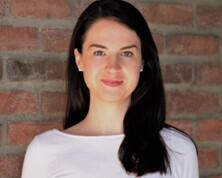
Adjusting to Life at SIPA
Transitioning to graduate school is an overwhelming but exciting time, to say the least. To get an inside look into what the transition to SIPA is truly like and for advice on how to best take advantage of your time here, we’re thrilled to highlight the experiences of two current students. Whether you are a recent graduate or have five or more years of work experience under your belt, there is a place for you in the Columbia and NYC community.

Kate Hyeon MPA '23
What informed your decision to pursue a Masters a year after receiving your undergraduate degree? What were your goals (professional or personal) in coming to SIPA?
The biggest motivation for applying to SIPA a year after receiving my undergraduate degree was the urge to garner a more accommodating perspective of others and the world. I have a bachelor's degree in business marketing, and while the learning was intellectually intriguing and enjoyable, being immersed and trained in a hyper-competitive environment made it challenging to find ways to practice empathy and ponder the repercussions of my behavior or work. It was unsettling that I thoroughly understood the mechanics of a system but not the world.
As the COVID-19 pandemic began, I began to consider attending graduate school and studying a different discipline that is more inviting and accommodating of diverse perspectives and interests. Coming into SIPA, I wanted to understand how macro events around the world shape each country's outlook and individuals' daily lives and attain the ability to interpret how events transcend their intended audiences. I hoped that by broadening my perspective, I would develop my strengths in understanding the intricacies of any action or decision, thereby contributing to creating a truly tangible and meaningful impact.
What did you find most challenging when adjusting to a graduate program vs. undergraduate? Most seamless?
Overall, adjusting to a graduate program was mostly seamless. The most seamless transition was regarding academics since it felt like a continuation of the routine I developed during undergraduate studies. The most challenging part, however, was the imposter syndrome that I experienced when it came to experience. I always felt that I did not have enough applicable skills obtained through multiple years of working, and I feared that this would make future employers think that I was incompetent for any role. With this, the advice from other alums who entered SIPA as recent grads were helpful. They suggested searching for a part-time internship or research opportunities throughout the two years to build your resume and tailor it to the area of interest you are pursuing at SIPA. As I did some internships throughout school, I discovered that my confidence significantly improved.
What have been your favorite part(s) about being at SIPA?
My favorite part about being at SIPA is the people I met here. Before I entered, I heard a lot about the caliber of the people and how the support network you will build here will exceed one's expectations, but I somehow thought that it would prove false. Yet, seeing and experiencing the amount of care we exhibit for one another has been the most enjoyable part at SIPA. I've met people who are not only deeply passionate about the areas they are studying but care deeply about each other -- I always feel lucky to be around such amazing people.
As you’re entering your last semester at SIPA, what advice would you give to recent grads around how to best leverage their time here? Is there anything you would have done to better prepare for this experience?
As I am nearing graduation, I have many regrets about how I should have leveraged my time here. I am a slow starter, so it took me a long time to adjust, and starting a graduate program in a new city was challenging. Regardless, I always tried to remind myself about my motivation for coming to SIPA and how I believed it would shape my future. This helped me rebuild my trust in myself and strategize how to navigate the two years to compensate for the relative (possible) lack of experience or skills. Hence, it would be helpful to define a narrower set of interests before entering, but two years and the abundant opportunities at SIPA are also enough to explore and decide.

Theresa Geck MPA '24
What informed your decision to pursue a Masters and what were your goals (professional or personal) in coming to SIPA? Please provide an overview of your background (ex: years of work experience, sector experience).
As a management consultant, I focus on helping health and life sciences companies to deliver strategies, optimize processes, and develop innovative approaches. I’ve always been very passionate about helping people and trying to improve situations. Coming to SIPA, my goal is to broaden my experiences beyond the private sector by pursuing skills in policy making and impact measurement to advance the well-being of society.
What did you find most challenging when adjusting back to school? Most seamless?
The most challenging part for me was to adjust to the short-circled time schedule. Every week we have quizzes, assignments, or papers due. That is something that I wasn’t used to in my previous graduate studies. And it requires extensive time management to fit everything under one belt. On the other hand, the professors and teaching assistants have been so supportive and approachable. This definitely has helped during my transition.
What have been your favorite part(s) about being at SIPA?
From my experience, the professors really want to see you succeed. They have been incredibly helpful throughout my first semester. As a mother of a 10-month-old baby, my days are planned out in detail to get everything accomplished. Thus, I don’t have much flexibility when it comes to modifications. My professors have been so understanding and offered to hold my baby to allow me to participate in a class event.
After having one semester at SIPA under your belt, how has your experience thus far informed how you will approach the remainder of your time here?
During the first semester I mainly focused on getting to know processes, structures, tools, and finding my way around on campus and in class. This has helped me to adjust and to know what is expected of me. For the upcoming semesters I’m really looking forward to participating in more events. The school offers incredible opportunities every week. I also hope to spend more time with SIPA friends as this is something that always comes too short.